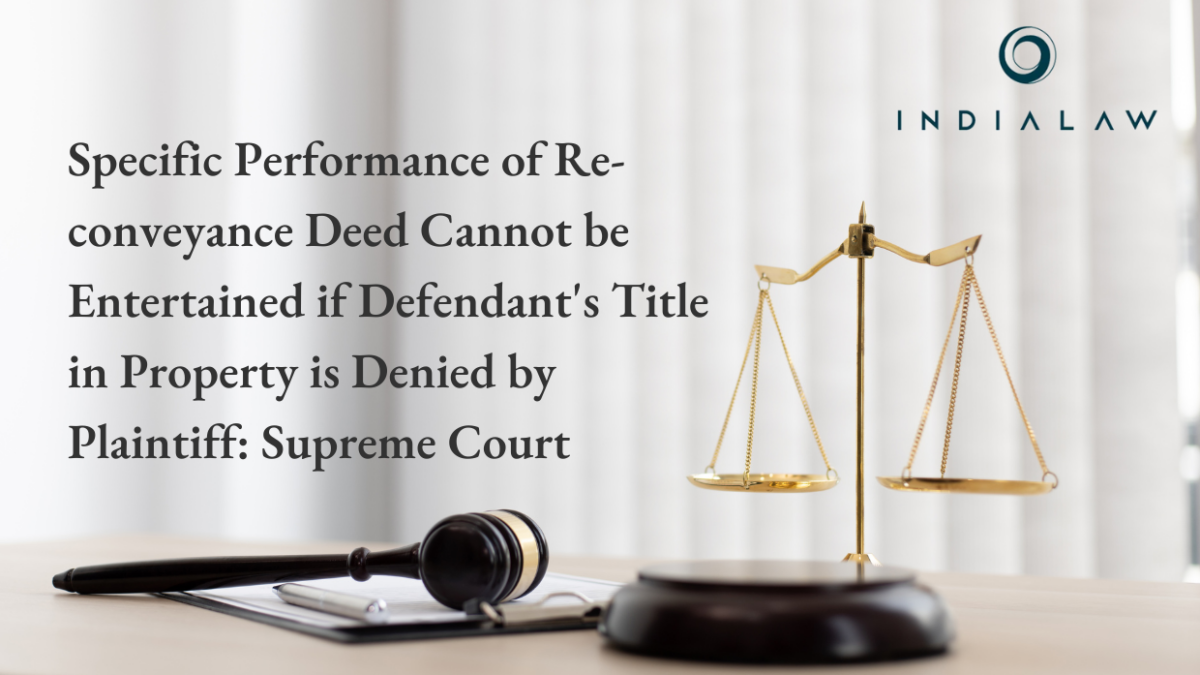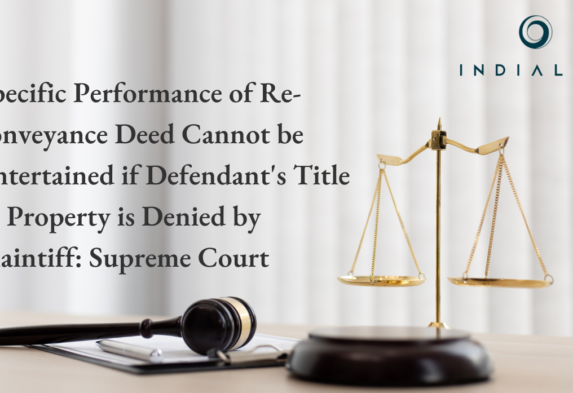Specific Performance of Re-conveyance Deed Cannot be Entertained if Defendant’s Title in Property is Denied by Plaintiff: Supreme Court


The Supreme Court, in a recent judgment[1] denied the plea of the appellants (Madhavan through legal representative and Ors.) seeking specific performance for execution of the re-conveyance deed.
The Court highlighted that from the plea of the appellants seeking specific performance against the respondent (Kanakavally), it is implied that the respondent was the owner of the suit property. However, the contention of the appellant was that the respondent held no right or title over the property. The Court clarified that specific performance of the re-conveyance deed cannot be sought when one party denies another’s title over the suit property.
The Division Bench of the Supreme Court comprising of Justice Abhay S. Oka and Pankaj Mithal stated that “Taking the averments made in the plaint as correct, there was no occasion for the appellants to seek specific performance compelling the respondent to execute re-conveyance deed inasmuch as, even according to the case of the appellants as pleaded in the plaint and in evidence that the respondent had no right, title and interest in the suit property.”
Table of Contents
Facts of the case
The plaintiffs (now appellants), namely Madhavan (first appellant) and Kaladevi (second appellant) were father and daughter. Kanakavally was the defendant (now respondent) who was a friend of the second appellant. It was alleged that the disputed property (“suit property”) belonged to the first appellant. The second appellant worked with the respondent. The first appellant had faced some financial challenges, and the respondent gave him a loan of Rs.13,000/.
For security of the said loan transaction between the first appellant and the respondent, a sale deed was executed on 03.10.1988 in favor of the second appellant and the respondent. It was averred that the same was a mere paper formality and only a security for the loan amount. Subsequently, on 03.03.1989, a registered release deed was executed by the second appellant in favour of Respondent relinquishing her rights in the suit property in favor of the respondent.
The second appellant and the respondent had entered into an agreement wherein it was agreed to assign the property to the second appellant or her nominee. As per the said agreement, any amount more than Rs.29,400/- would be paid to the appellants. The contract was to be carried out on or before 19.06.1990. However, the respondent made an attempt to sell the suit’s property. Hence, a suit was filed for specific performance of the contract and injunction restraining the respondent from selling the suit property.
The decree of specific performance was passed by the Trial Court in favor of the appellant, on an appeal against the said order the High Court has set aside the same. Hence, an appeal was filed before the Supreme Court.
Findings of the Supreme Court
The Supreme Court, after considering the pleadings of the parties, evidence and impugned orders of the Courts, stated that the suit agreement between the second appellant and the respondent was to re-convey the suit property in favour of second appellant or her nominee.
It was observed by the Court that “when a prayer for specific performance of agreement for sale or an agreement to execute a re-conveyance is made in a suit and when the plaintiff seeks execution of the sale deed from the defendant, it is implicit that the plaintiff has to accept the title of the defendant.”
The Court highlighted the point that the second appellant has no power to transfer her share in the suit property in favour of the respondent. Even after execution of deed of relinquishment between the second appellant and the respondent, only first appellant has right over the suit property. The Court noted that during the pleadings and in the examination-in-chief of the first appellant, he has stated that the sale deed was only on paper as security, and he has not lost any right of possession.
The claim of the appellant was that the respondent had no right over the suit’s property, however, the plea of specific performance of the contract implies that the respondent was the owner of the property.
The Division Bench noted that “The agreement for sale on the basis of which specific performance was claimed by the appellants proceeds on the footing that the respondent has become the owner. However, in the plaint, the appellants have asserted that notwithstanding the execution of the sale deed and release deed, no right, title and interest in the suit property was transferred to the respondent and rights of the first appellant in respect of the suit property continued to exist and the appellants continued to be in possession.”
Decision of the Supreme Court
The Supreme Court, in the instant judgment, underscored that specific performance of re-conveyance deed cannot be sought by the appellants wherein they are denying the title of the respondent over the property.
The Supreme Court further noted that the appellants have not filed a suit to declare the sale deed and release deed as null and void or challenging the same to be non-binding on them. They averred that they have the possession of the suit property. Considering the facts and evidence on record, the Division Bench concluded that no relief can be granted to the appellants and dismissed the appeal.
[1] MADHAVAN (DEAD)THROUGH LRS. v. KANAKAVALLY., Diary No.- 1069 – 2011, 2023 LiveLaw (SC) 1030




